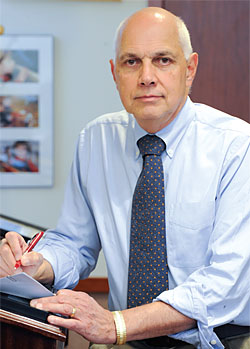 I had the good fortune recently to share a conversation about poverty with Peter Edelman. Professor Edelman serves as co-director of the Georgetown University Law Center and the Center on Poverty, Inequality and Public Policy. He continues a long and illustrious career advocating for the poor and the voiceless, having served alongside, among others, Sens. Robert F. Kennedy and Edward M. Kennedy and in President Clinton’s administration. We are both privileged to serve on the Board of Directors of the Robert F. Kennedy Center for Justice & Human Rights.
I had the good fortune recently to share a conversation about poverty with Peter Edelman. Professor Edelman serves as co-director of the Georgetown University Law Center and the Center on Poverty, Inequality and Public Policy. He continues a long and illustrious career advocating for the poor and the voiceless, having served alongside, among others, Sens. Robert F. Kennedy and Edward M. Kennedy and in President Clinton’s administration. We are both privileged to serve on the Board of Directors of the Robert F. Kennedy Center for Justice & Human Rights.
I began the conversation by wondering whether it’s even possible to discuss poverty without discussing inequality. Both are central issues for me as I work to carry forward NYSUT’s mission to advance equal opportunity and access to high quality public education, health care and public services. We agreed that you cannot separate poverty from inequality — certainly not in the United States today.
Poverty and inequality have drawn a great deal of attention lately, not only in Edelman’s book, So Rich So Poor, but also Joseph E. Stiglitz’s work, The Price of Inequality, and Robert Reich’s film, “Inequality for All.” After reading both books and seeing the film, I am more convinced than ever that the failure to address inequality — resulting in the shrinking of the middle class and the significant growth of poverty — is at the core of the challenges facing educators, health care workers and public service employees.
The facts are frightening: 46.5 million Americans live at or below the poverty level, 15 million more than in 2000; children make up 24 percent of the population, yet are 36 percent of those living in poverty. An academically successful student living in poverty is less likely to graduate college than an academically weak affluent student; 42 percent of those in poverty never get out.
Educators, health care workers and public service providers point to the impact of poverty — not as an excuse, but as the reality they face each day. They see poverty as a fundamental obstacle in their struggle to deliver quality services whether in rural, suburban or urban communities.
Economic policy, deregulation and the current tax structure have played a major role in widening the wealth gap and, using Stiglitz’s term, “hollowing out” the middle-class. This has resulted in an even greater increase in both the wealth of the super-rich at one end and in the numbers falling into extreme poverty at the other. There is growing evidence that this will lead to an economy that will lack the conditions needed to sustain growth even for the wealthiest, yet there is little to suggest that change is in sight. The reality that “sustained prosperity requires shared prosperity” (Stiglitz) is dismissed by most in elected office.
Change will require political will. As Stiglitz points out, income inequality is not naturally occurring but rather manufactured through economic policy. The food stamp battle in Washington; and the most recent sequestration, shutdown and debt battle nationally don’t bode well for such change. Nor does the inequitable distribution of state aid in New York and Gov. Cuomo’s decision to create a new tax commission to cut taxes. Redistribution of income is needed, but, unfortunately, it is already occurring in the wrong direction.
The continued polarization of wealth, power, politics and the labor force remains unchecked. Inequality of opportunity is the norm. The political will to reverse these conditions does not appear to exist. As Edelman points out, as long as those in the middle identify more with those on the top than at the bottom, we’re “doomed.”
To change this, giving voice to the voiceless is what is needed. Reich’s film makes clear that while this is a fundamental role of government in a democracy, ours is doing the opposite. Giving voice to the voiceless is also a role of unions, a role we are morally obligated to play, and one we must diligently pursue to counter government’s failure. Political organizing and issue organizing are essential. Engaging members and communities in political action to change policy — or those who make policy — is a fundamental tool of unions.
I ended my conversation with Peter Edelman with a reference to his New York Times op-ed published in July 2012. In it he notes, “History shows that people power wins sometimes.”
I asked if he thought this is one of those times. His answer, “We have to think that.”
I agree.
Follow President Iannuzzi on Twitter: @RichardIannuzzi
Note: Your comments on this column or any issue you wish to share directly with me are welcomed. Email your thoughts to dialogue@nysutmail.org.